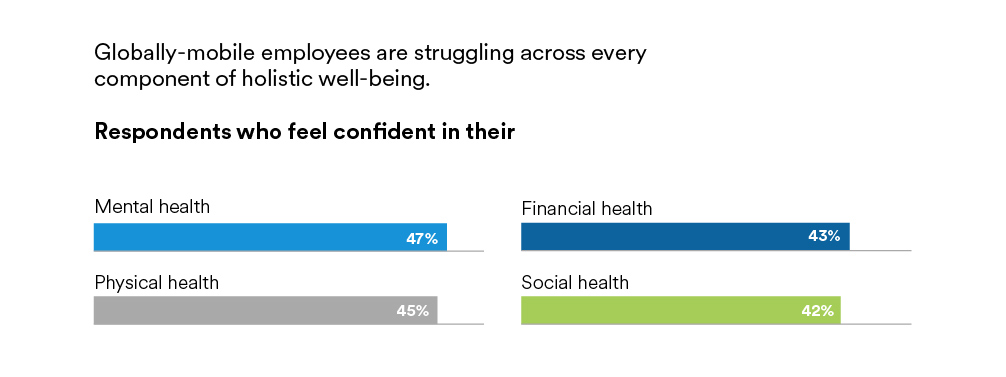MetLife Employee Benefit Trends
Rising to the Globally-Mobile Workforce Needs in the New Normal
The COVID-19 pandemic has reshaped the face of modern life, both in terms of our work and personal lives.
According to MetLife’s new expatriate study, based on the 18th Annual U.S. Employee Benefit Trends Study data, non globally-mobile employees, otherwise known as workers who take assignments abroad, cited workplace stress and finances among the top concerns, both before and at the start of the pandemic.
From being in a new country to adapting to new cultures, most expatriate (U.S. citizens working abroad) and inpatriate (foreign citizens working in the U.S.) workers who are navigating unique work and life challenges experience higher burnout rates, higher levels of stress, and lower quality mental health when compared to non globally-mobile workers (U.S. employees who have not worked abroad).
For example, forty-one percent of globally-mobile employees in WAVE 1 reported being stressed out, 40 percent experienced burnout, 37 percent felt discouraged at work and a third reported being depressed versus 33 percent, 30 percent, 22 percent and 15 percent of non globally-mobile employees responding the same way, respectively.

The blended work-life world has become more intense and stressful for globally-mobile employees compared to the domestic workforce, and this juggling act has become even harder to manage. Half of the globally-mobile employees surveyed in WAVE 1 claimed to struggle maintaining a work-life balance in organizations that expect their staff to be available and accessible beyond the conventional 40-hour workweek. By contrast, only 36 percent of non globally-mobile employees said the same.

Most globally-mobile employees state that work-life balance can be improved through an increased acceptance of flexible working hours, clearly defined barriers between work and personal life, and initiatives that encourage employees to “log off” and spend time on personal pursuits or with family. Providing additional paid time off, life insurance policies, access to telehealth services, and paid family leave are all also within the top ten initiatives these workers say would benefit their professional and personal lives.
Additionally, both expatriate and inpatriate workers suggest that their employers take a more active role in supporting their holistic well-being. Most employers agree. However, there’s a significant disconnect between workers and their employers when it comes to perceptions of health.
Globally-mobile employees are struggling across every component of holistic well-being. Only 47 percent of respondents feel confident in their mental health, 45 percent in their physical health, 43 percent in their financial health, and 42 percent in their social health.

Of surveyed employers, 84 percent believe these employees were mentally and physically healthy, 83 percent thought their globally-mobile workforce felt socially healthy, and 79 percent said that these employees felt secure in their financial health. The gap in perceptions between employees and their employers is staggering. Part of this disconnect may have to do with the scarcity of holistic well-being programs for those working abroad.
A robust, end-to-end benefits program for globally-mobile employees can go a long way toward making life a little more manageable for expatriates and inpatriates. Addressing the specific needs and obstacles that come from taking an assignment abroad can help employees stay productive, upbeat and less stressed. Even if employers can’t forecast what life will be like in the medium- to long-term, they can support their globally-mobile staff through custom-tailored tools, flexible working policies and meaningful conversations.